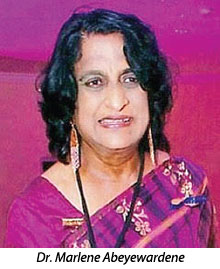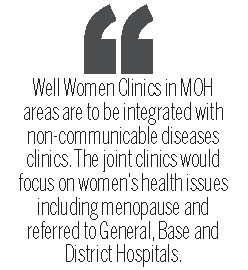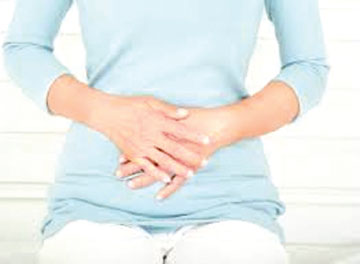
It is a natural mid –life crisis which every woman experiences when she hits her late forties. Yet, many remain ignorant on how to deal with it, some considering it a subject not to be talked about even with their closest friends or family, ending up with psychological problems like depression or loss of self esteem.
 Senior Consultant Obstetrician & Gynaecologist and Past President of the Menopause Society of Sri Lanka ( MSSL) Dr. Marlene Abeyewardene tells the Sunday Observer how to detect the onset of menopause, its health impacts and what the Menopause Society of Sri Lanka (MSSL) is doing with the Health Ministry to help women experiencing this mid life crisis.
Senior Consultant Obstetrician & Gynaecologist and Past President of the Menopause Society of Sri Lanka ( MSSL) Dr. Marlene Abeyewardene tells the Sunday Observer how to detect the onset of menopause, its health impacts and what the Menopause Society of Sri Lanka (MSSL) is doing with the Health Ministry to help women experiencing this mid life crisis.
Excerpts…
Q. On October 18 the world will focus on a subject which many women are still ignorant about - menopause. What is menopause?
A. Menopause is defined as the final stoppage of the menstrual period in the life of a woman. At birth, a girl child has sex organs which are necessary for bearing children. These include two ovaries producing hormones Oestrogen and Progesterone necessary for female characteristics and child bearing. The other organs are the “womb” or uterus comprising of three parts, a body, a neck or cervix and a cavity. They also have a vagina which opens to the exterior through a vaginal orifice in the vulva. The external genitalia seen outside are the clitoris and labia. At puberty the ovaries start functioning and begin to produce the hormones under the influence of which the ovarian follicles within the ovary numbering 750,000 at birth start maturing. After the onset of the first period, one ovum which is matured is shed during each menstrual cycle. Normally, menstrual cycles occur once in 28 to 30 days. The ova which are shed during each cycle are not replaced, the number of ova thus progressively decreases. Production of the hormones therefore tends to decrease progressively with increase in age leading to the symptoms and signs associated with the menopause around 48 to 51 years.
Q. Other reasons for menopause to occur?
A. In some women it can occur at an earlier age for various reasons.
 A) Pre-mature menopause which may occur around 30 years of age. This is caused by primary ovarian failure due to atrophy of ovarian tissue thought to be due to an auto immune disease where the body produces antibodies which destroys its own ovarian tissue. Oestrogen and Progesterone production thus ceases, leading to a stoppage of periods and the accompanying symptoms which occur.
A) Pre-mature menopause which may occur around 30 years of age. This is caused by primary ovarian failure due to atrophy of ovarian tissue thought to be due to an auto immune disease where the body produces antibodies which destroys its own ovarian tissue. Oestrogen and Progesterone production thus ceases, leading to a stoppage of periods and the accompanying symptoms which occur.
B) Early menopause could also occur in pathological conditions which may need surgery for the removal of the uterus with or without the removal of one or both ovaries. Such conditions could be Fibroids or Adenomyosis which causes heavy periods associated with abdominal pain, Pelvic Endometriosis and Pelvic Infection or malignancies of the female genital organs which may also necessitate Hysterectomy or removal of the womb.
Q. Stages of menopause?
A. The process of menopause occurs in 3 stages: Peri-menopause, where the cycles become irregular around the age of 47. A woman may only feel hot flushes during this stage and it may be possible for her to get pregnant. Thus pregnancy should be excluded if a period is missed: The menopause itself, which is the stoppage of the menstrual period for one year. This usually occurs within 4 years after the peri-menopause. It is not possible to get pregnant during and after this stage without intervention: And the final stage which is the Post-menopause which follows when the Oestrogen and Progesterone secretion in the body continues to decrease further.
Q. Symptoms in women experiencing menopause?
 A. During physiological menopause the first sign is hot flushes and excessive sweating with irregular periods. Once menopause occurs other problems may be experienced, such as, insomnia and sleep disturbances, a rapid heart rate, headaches, mood swings leading even to depression, frequency of micturition, (passing urine), vaginal dryness and difficulty in sexual intercourse, lack of libido, lack of energy.
A. During physiological menopause the first sign is hot flushes and excessive sweating with irregular periods. Once menopause occurs other problems may be experienced, such as, insomnia and sleep disturbances, a rapid heart rate, headaches, mood swings leading even to depression, frequency of micturition, (passing urine), vaginal dryness and difficulty in sexual intercourse, lack of libido, lack of energy.
Changes in external appearance too occurs, such as graying of hair, dryness of skin, development of wrinkles, dark pigmentation on the skin of the face, atrophy of the breast leading to sagging, excessive deposition of fat around the waist and shoulders, loss of bone from the skeleton and long bones without replacement due to the lack of hormone. Oestrogen deficiency leads to osteoporosis, joint pains, arthritis and even loss of height. It also leads to an increase in the level of blood lipids, i.e. Cholesterol, LDL Cholesterol and Triglycerides which can pre-dispose to heart attacks and cardiac disease. High blood pressure and diabetes mellitus may also manifest after menopause contributing to complications in the heart, brain, kidneys and eyes.
Q. Organs affected by menopause?
A. Organs commonly affected by the lack of Oestrogen, Progesterone and other hormonal changes during the menopause are the cardio vascular system, the brain, the blood vessels, the skin, the ovaries, the lining of the womb or the endometrium and the eyes. The effect on the brain can manifest as a simple loss of memory for recent events, depression, psychosis, or progress to Dementia. Alzheimer’s and Parkinson’s could also occur. Brain changes are due to alterations in the cells of the different parts of the brain due to a reduced blood circulation occurring with age.
Q. Reaction to menopause in general?
A. Women react to menopause in different ways depending on their knowledge about it and the signs and symptoms associated with it as well as the severity of the symptoms. Education about it is thus extremely important. Some women may develop mild symptoms which they accept and are able to deal with while others seek medical advice due to the difficulties they experience to cope with their day to day lives. Proper counselling and investigations are needed to exclude other diseases which may also occur at this stage and decide on treatment procedures like hormone replacement therapy.
Q. Can women resume normal sexual relationships with their male partners after menopause?
A. Many women continue to have normal sexual relationships with their partners. However, often they may find a lack of sexual urge or libido which is associated with a lack of Oestrogen in their bodies.
This together with the dryness of their vagina due to degeneration of the vaginal epithelium caused by Oestrogen deficiency makes sexual intercourse difficult and painful. Counselling is often required by a Gynaecologist or a Psychiatrist often with the advice of the need to use a lubricant in order to increase the laxity of the vaginal muscles, thus causing less pain. A focus on improving the foreplay prior to sexual intercourse is also advisable.
Q. Are there separate services available for women with menopause in Sri Lanka?.
A. The Sri Lanka College of Obstetricians and Gynaecologists realising the importance of focusing on women who were in the post reproductive period of their lives set up the menopause Society of Sri Lanka in the year 2000. The focus was on the problems faced by women during menopause due to the changes which occur in their body, keeping in mind that the age of menopause onset in our country was between 48-51 years.
The Menopause Society of Sri Lanka initiated training mid-wives, public health nurses, young doctors, MOHs in the different parts of the country to focus on this phase of a woman’s life. Programs were carried out island wide addressing these categories of medical staff on questions which were needed to be asked from their patients with respect to whether they were experiencing the symptoms of peri-menopause, menopause or post-menopause. To educate the public on these issues, medical lectures were also organized by members of the menopause Society on the electronic and print media addressing these issues. In 2010, the South Asian Federation of Menopause Societies was inaugurated initiated by the Sri Lanka menopause Society so that the problems which women in the South Asian region face during this period of their life could be discussed and we would be able to work together to assist our women to overcome the issues faced by them.
Q. Are the available facilities and services for women who need your services adequate?
A. Facilities available at present for women in all income groups in Sri Lanka is adequate. The Ministry, with the menopause Society has also started Well Woman Clinics in all MOH areas. These clinics would be integrated with the noncommunicable diseases clinics already in progress so that the joint clinics would focus on women’s health issues including the menopause related problems and any problems detected could be referred to the General, Base and District Hospitals. This program has already been initiated by the Ministry of Health, however, further improvement is needed to obtain optimum results.
Q. Gaps you would like to see filled?
A. We have found, a large proportion of women to be still ignorant of the problems which they experience at this time and where they can obtain medical advice to relieve them. This message should reach women at all levels of society in the remotest areas.
Q.Plans for the future?
A. Organize Well Woman Clinics islandwide for women of any social level: Aim at early cancer detection by carrying out pap smears and ultra sound scans to detect cervical, ovarian and other gynaecological cancers islandwide. Carry out educational programs on self examinations of the breast and provide access for breast scans and mammograms by referral to suitable centres. All this would help our women to lead healthy and happy lives.
